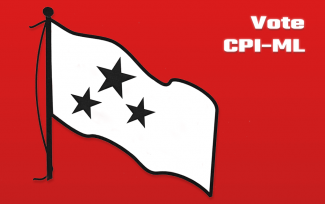
(Profiles of some of the candidates and seats where the
CPIML is contesting Lok Sabha Elections 2019)
BIHAR
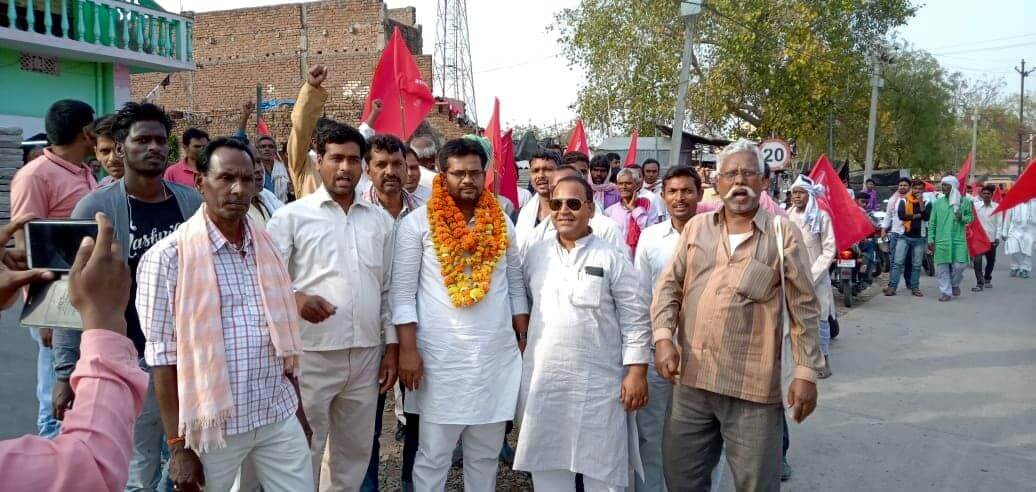
Arrah and the Battle For Democracy
-- Sudhir Suman
BHOJPUR's history of struggles against political, social, cultural and economic inequality that have taken place here is unique. The revolutionary dream of Naxalbari and CPIML that the state sought to brutally suppress, was rejuvenated on the soil of Bhojpur. Here also many comrades became martyrs during the struggles, including Jagdish Master, Rameshwar Yadav, the second General Secretary of CPI(ML) Subrat Dutta (Jauhar), Dr Nirmal, Bootan Musahar and many others. The ruling classes once again believed that they had killed the attempts at revolution.
But the then General Secretary Comrade Vinod Mishra and peerless leader of the Bhojpur revolution Comrade Ramnaresh Ram continued to lead the expansion and impact of the CPI(ML). The Party expanded its work in various areas of struggle. The 80s were witness to the formation of a popular people’s political front (IPF) and an unprecedented peasants’ movement in Bihar. The CPI(ML) was active on the electoral front under the banner of the IPF. They carried out a struggle for the right of the poor to vote, and in 1989 Comrade Rameshwar Prasad, from a poor very backward community, entered Parliament by winning the Ara Lok Sabha seat. Rameshwar Prasad also won the Sandesh Assembly seat in Bhojpur twice. Ramnaresh Ram, whom the feudal landlords had prevented from winning the 1967 Assembly election by booth-capturing and attacking his election agent Jagdish Master, won the Assembly seat after 28 years by a thumping margin and no one could defeat him thereafter during his lifetime. These two leaders fought for the same issues inside Parliament and Assembly for which they used to organise and mobilise the people for struggles on the streets and in the villages. Even today their names are a by-word for commitment to the people.
The CPI(ML) candidate for Ara (Bihar) in the 2019 Lok Sabha elections, Raju Yadav is the inheritor of this glorious tradition of struggle. Raju Yadav’s native village Gorpa is close to Ekvari village in Sahar Block from where the Bhojpur movement started. Raju was born here as the second child of Kusum Kunwar and Ramtavakya Singh. He has two sisters, Ramawati Devi and Sitasundar Devi.
Raju’s father Ramtavakya Singh was a CPI(ML) activist. He was well-known among Party activists and supporters as RT Singh. He was a jawan in the Indian army. During those days the CPI(ML) was an underground Party. In that underground phase, Party General Secretary Vinod Mishra was known to Party activists and supporters as Raju Ji. It was after him that RT Singh named his son Raju. Raju’s father passed away due to an illness when Raju was still a child.
He studied from Std III to Matric at the Hitnarayan Kshatriya School in Ara. After Inter from Maharaja College, BA from Jain College and MA from Veer Kunwar Singh University, he studied law from Maharaja Law College, Ara. During his student days, Raju decided to follow in his father’s footsteps and walk the political road.
Raju Yadav began his political journey in the year 2000. He became a member of the student organisation All India Students Association (AISA), and was made the Ara City Coordinator of AISA. A year later in 2001 he became the AISA District President. He became a member of the CPI(ML) Ara City Committee in 2002 and a member of the District Committee in 2005. From 2007 to 2011 he discharged his responsibilities as AISA Bihar State President. In 2012 he became the State President of the Revolutionary Youth Association (RYA).
In 2016 he was elected a member of the CPI(ML) State Committee and in the same year he became a member of the National Executive Council of the All India Kisan Mahasabha. At the 10th Party Congress held at Mansa, Punjab in 2018 he was made a member of the CPI (ML) Central Committee. Thus, in his political journey of 19 years he has discharged important leadership responsibilities on student, youth, and farmer fronts.
He has also had valuable experience in electoral battles. In 2010 he first stood for election from the Badhara Assembly constituency in Bhojpur. In 2010 he was the CPI(ML) candidate from the Sandesh Assembly constituency. In the 2014 Lok Sabha election, despite sharp polarization between the BJP and RJD, Raju Yadav as the CPI(ML) candidate polled about 1 lakh votes. In 2019 the Party has once again fielded him as the Lok Sabha candidate from Ara. This time he has the support of the RJD and the Mahagatbandhan.
He is fighting this election as a representative of the Bhojpur movement and its inherent dreams and as a trusted voice against the autocratic, pro-corporate politics of feudal-communal-casteist frenzy, loot, and lies practiced by the Modi-BJP-Sangh government. Voters who truly aspire for social justice, equity, harmony, freedom and development are mobilising themselves in his support.
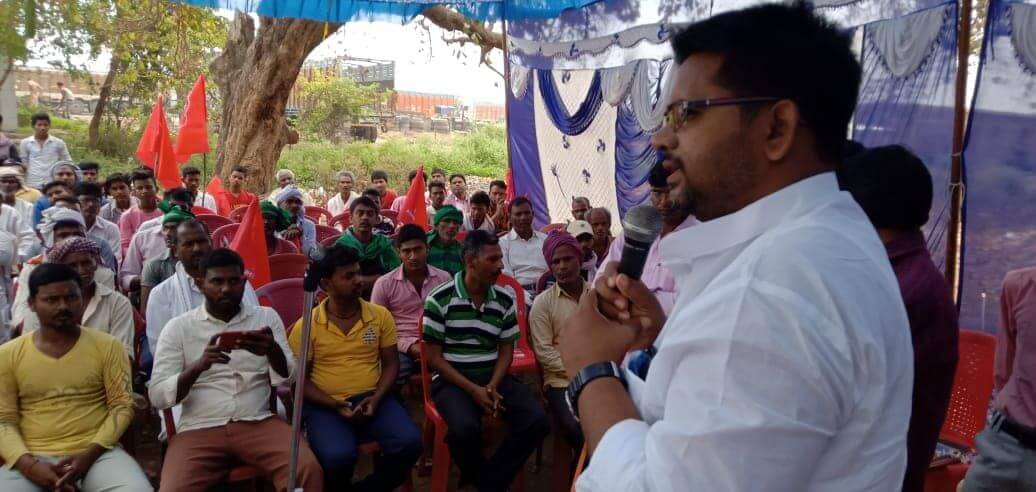
Raju Yadav has been especially popular among students, youth, teachers, farmers, workers, and working women. He led several successful movements on students’ issues. He led the agitation and hunger strike after which Veer Kunwar University was given UGC recognition. Through struggles, he ensured the implementation of reservation on all levels at the University. He led struggles to prevent the closure of Maharaja Law College and to guarantee implementation of reservation rules. When fees were being hiked by educational institutions across the country, he led the struggle at Veer Kunwar Singh University to ensure that fees were not hiked there. He led protests under the banners of AISA and RYA to fight decisive battles against the abysmal conditions in hostels for dalit students and against attacks by Ranveer Sena goons on poor and dalit students after the killing of Brahmeshwar Mukhiya.
Raju Yadav was in the frontline of the countrywide ‘Bekhauf Azadi’ (Fearless Freedom) movement. He has been part of every struggle in Bhojpur against incidents of sexual violence and atrocities on women. He has led struggles for punishment to the guilty in cases of rapes and gang rapes of minor girls and mahadalit women. He played a leading role in agitations by ASHA workers, Rasoiyas, Sevikas, and other scheme workers and the statewide agitation against the horrifying Muzaffarpur Shelter Home incident.
He also led movements on the issues of irrigation, water supply through canals, diesel grant, crop loss compensation, and paddy purchase. He had sat on an indefinite hunger strike at Ara on these issues. Raju Yadav has always been a part of struggles for basic facilities like electricity, roads, health and education. His presence is always visible in protests at Bhojpur and Ara against criminal incidents and murders.
The BJP-Sangh has constantly attempted to fan communal flames in the Bhojpur region. Raju Yadav as a CPI(ML) leader has always worked to foil these evil designs of the Sangh, be it the conspiracy to incite communal frenzy in the name of cow at Raniganj or attempts to instigate riots at Gadhani and Sahar. Generally, political parties shy away from such issues in the name of majoritarianism but protests against communal attacks on minorities is also an issue of social justice, and Raju Yadav has always fought for this.
Raju Yadav is immensely popular across all sections due to his struggles for unemployed youth, students, dalits, backward sections, poor, working classes, farmers, workers, and women. It is not an over-exaggeration to say that he is the hope of progressive-democratic people. He is with the people in their sorrows as well as their joys. In contrast to the bureaucratic attitude of BJP candidate RK Singh, people feel Raju Yadav to be a member of their family. He represents ‘people’s power’ as against the ‘wealth power’ which is being used so lavishly in the elections. He is the true inheritor of the people’s democratic political tradition where elections are fought with the support of the people and the candidate, after getting elected, works in the interests of the people.
Raju Yadav is a product of the Left democratic political movement for social, political and economic change. He is a representative face of this movement, and he is not alone. A long line of young people committed to changing the anti-people character of governments and society is with him; they have come up as people’s leaders from among the dalit, marginalised, backward and poor sections of society. This is the priceless contribution of the Bhojpur movement. It is through this movement that a Chintu Kumari, daughter of poor landless parents, becomes the General Secretary of JNUSU, and dozens of youth leaders like Manoj Manzil, Shiv Prakash Ranjan, Qayamuddin Ansari and Ajit Kushwaha are leading the fight to change the socio-political structure in the country. This is Bhojpur, about which people’s poet Baba Nagarjun wrote in his poem ‘Bhojpur’:
Bhagat Singh has been reincarnated
Here’s the place
Here’s the very place
Chandrashekhar Azad is also reborn
Here’s where we can find Vaikunth Shukla
And somewhere here too is Bagha Jateen.
At present the battle is on the election front. In this battle it is Raju Yadav versus the fascist forces which stand for hate, frenzy, injustice, oppression, inequality, and massacres. The greater the number of representatives to reach Parliament against these fascist forces, the stronger will become the fight to protect and strengthen the country’s Constitution and democracy. We have every hope that the people of Ara will send a people’s democratic voice to Parliament against a pro-corporate Manuvadi dispensation.
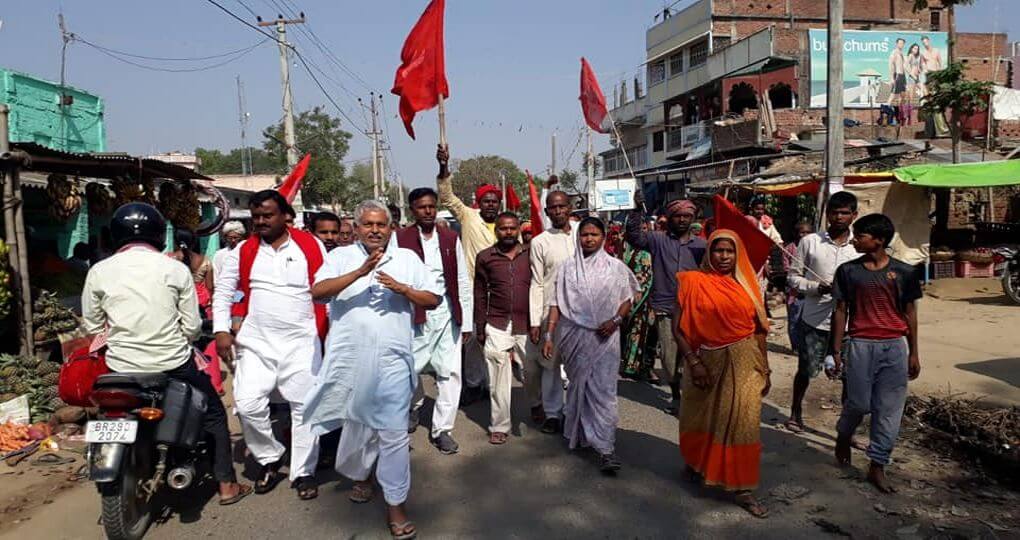
Siwan Resists 'Yogi Model' In Comrade Amarnath Yadav's Leadership
The CPIML candidate from Siwan (Bihar) is Comrade Amarnath Yadav.
Born in Kavilpura, Hussainganj, Siwan District, 53 year old Comrade Amarnath Yadav is a member of the CPI(ML) State Committee and the State Vice President of the Bihar State Kisan Sabha. He was elected MLA from the Darauli Assembly constituency in 1995, polling about 36,000 votes and defeating Rural Development Minister in the RJD government Shivshankar Yadav by more than 14,000 votes. Earlier also, he has fought from the Siwan Lok Sabha constituency as the CPI(ML) candidate, where he polled 2.55 lakh votes in 1999.
Comrade Amarnath did not receive much school education but he has got a thorough schooling in life’s struggles. His father was a poor farmer. Working among workers and farmers, he came into contact first with the CPI and then with the CPI(ML). He became a member of the CPI(ML) in 1982 and started organizing the poor. Very soon he became a member of the CPI(ML) sub-zonal committee and the Siwan District committee. He was a leading figure in the Indian People's Front and the Bihar State Kisan Sabha in Siwan.
While leading people’s struggles, he was jailed for five month in 1985. He was seriously injured in the brutal police firing at Krishnapali (Mairwa Block) in 1989. During that period, he was implicated in about a dozen false cases with the connivance of the dominant forces-police nexus. Immediately after he won the 1995 election he was thrown into jail under a false case. He was released after he remained in jail for 33 months. This pattern still continues today, with many other ML leaders jailed for false cases in the course of struggles against feudal forces. Comrade Amarnath courageously led the people’s struggles against criminal don from Siwan, RJD MP Shahabuddin, who was backed by feudal forces.
Comrade Amarnath Yadav is a beloved people’s leader from Siwan District. He is the voice of the poor, dalits, backward castes and minorities, and has always been true to the tradition of sacrifice and struggle for the people.
With Gorakhpur next door, Yogi Adityanath and his Hindu Yuva Vahini is trying hard to make inroads in Siwan. In fact the NDA candidate from Siwan, Kavita Singh, is the wife of a notorious feudal-criminal Hindu Yuva Vahini leader Ajay Singh. Amarnath Yadav and the CPIML boldly lead the effort to protect Siwan from these vicious communal forces and defend the rights of minorities. The CPIML is also the only party which has taken up the cause of innocent Muslim youth of Bihar falsely implicated in terror cases by the NIA.
Comrade Amarnath Yadav is today the most trustworthy and popular leader in the ongoing effort to keep feudal and communal forces out of Siwan and Bihar.
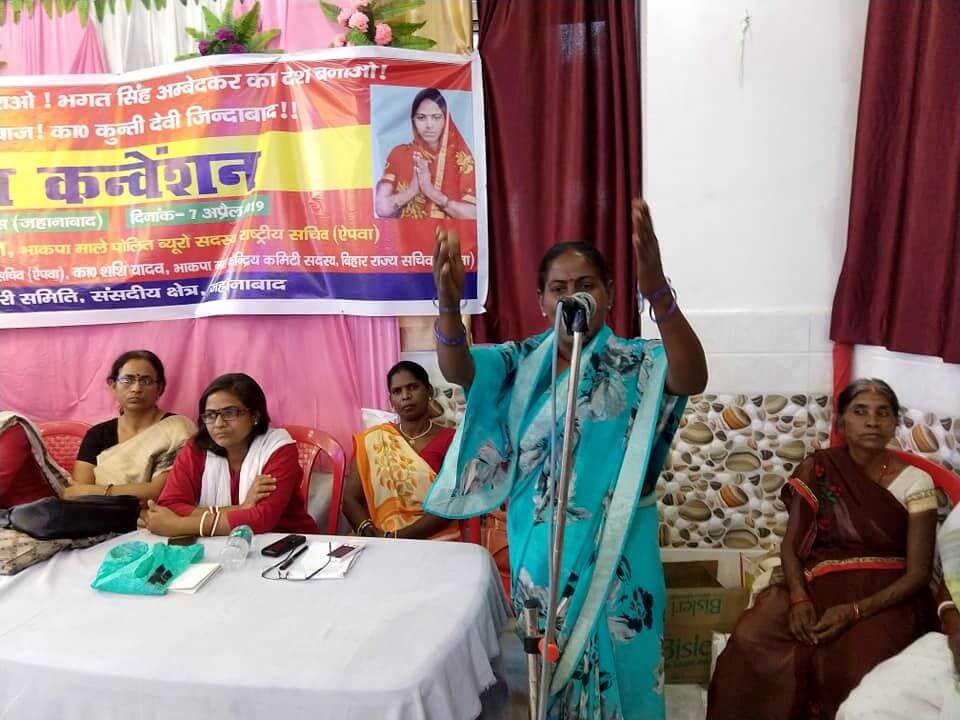
Comrade Kunti: Jehanabad's Revolutionary Leader
Comrade Kunti Devi is the CPI(ML) candidate for the Jehanabad constituency of Bihar in the 2019 Lok Sabha elections. She enjoys great respect in the area as a legendary leader of the struggles of the landless Dalit and extremely backward poor.
Kunti was born in the village of Isse Bigaha - a hamlet - tola - with a population of Bind and Kahar extremely backward communities in the year of 1967, when the ‘thunder of spring’ resonated from Naxalbari.
Kunti is the eldest of seven children born to Somariya Devi and Buddhadev Bind, a committed CPI leader of his times. She had two younger brothers and four younger sisters. Her father was a Block-level leader in the CPI, had passed Matriculation, and had a bit of land which he cultivated.
Kunti was not sent to school although she evinced a keen interest in studies and there was a school nearby on land donated by her father. In those days, it was not the practice in this Tola to educate girls. Having the responsibility for five daughters, her father married her off in her childhood in village Sarkanda near Bharatpura in Patna District.
Bistoul and Kumhawa are two neighbouring villages with a dominant population of Rajputs who perpetrated cruel repression on the poor of these villages as well as other nearby villages. The poor of Isse Bigaha were united against this repression, and along with them Kunti too was inspired to join the CPIML which was organising the struggles for land, wages and dignity. She made her mark as a leader, organising women to resist police repression at a time when the police acted as an arm of the feudal forces.
In 1980, Kunti became a whole time activist of CPIML at a time when few women could do so. In the process she had to overcome resistance from her family members, leading to her separation from her first husband.
In 1983 Kunti led the struggle against the notorious Arwal police firing and massacre which took place in April 1983 and reminded the country of the April 1919 Jallianwala Bagh massacre. In 1986 she went to Tekari (Gaya) where the terror of the MCC was rampant. She was with Comrade Vidrohi when he blackened the face of Bhagwat Jha Azad in Damuha-Khagri. She was arrested but released after being detained in the Thana. In 1989 she once again came to work in Arwal.
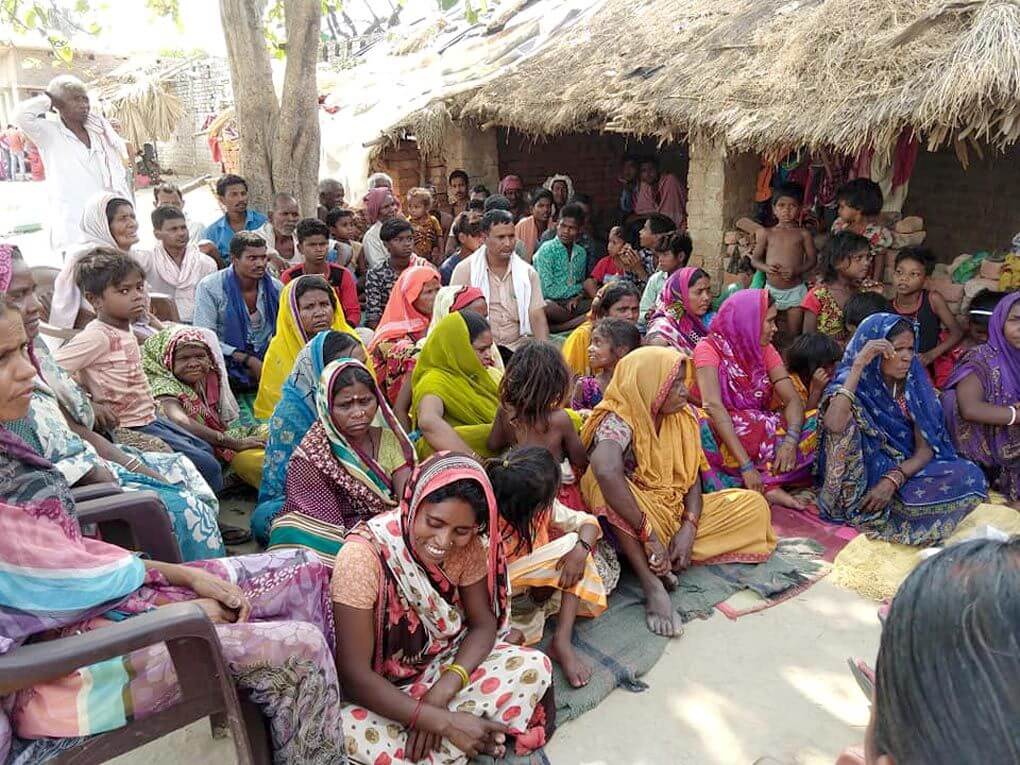
In 1985 when the Janwadi Mahila Manch (today’s All India Progressive Women’s Association AIPWA) was founded, Kunti became the District Secretary. She was in the front line of women leaders in the Magadh region, along with Meena, Mahendri, Savitri, Sheela, Samphul, Shanti, Kalavati, and above all, her friend and comrade Manju Devi who was later killed by the Ranveer Sena.
Kunti was the IPF-CPI(ML) Assembly election candidate in 1990 (Makhdumpur), February 2005 (Ghoshi) and and October 2005 (Jehanabad). She has also been on the IPF and AIPWA State Committees. In 2003 she was elected District Councilor from Jehanabad-Part 2. In 2004 she became a member of the CPI(ML) State Committee.
Comrade Kunti has faced imprisonment, cases, and death threats, but she is the strong face of the revolutionary women’s movement in Bihar who has never been bothered by such adversities. Kunti, born in 1967, is a symbol of the revolutionary ‘spring thunder’ in the true sense of the term. She is a powerful reminder that the women of oppressed communities of rural India should not be seen as victims needing 'uplift' but as leaders of the struggles for social transformation.
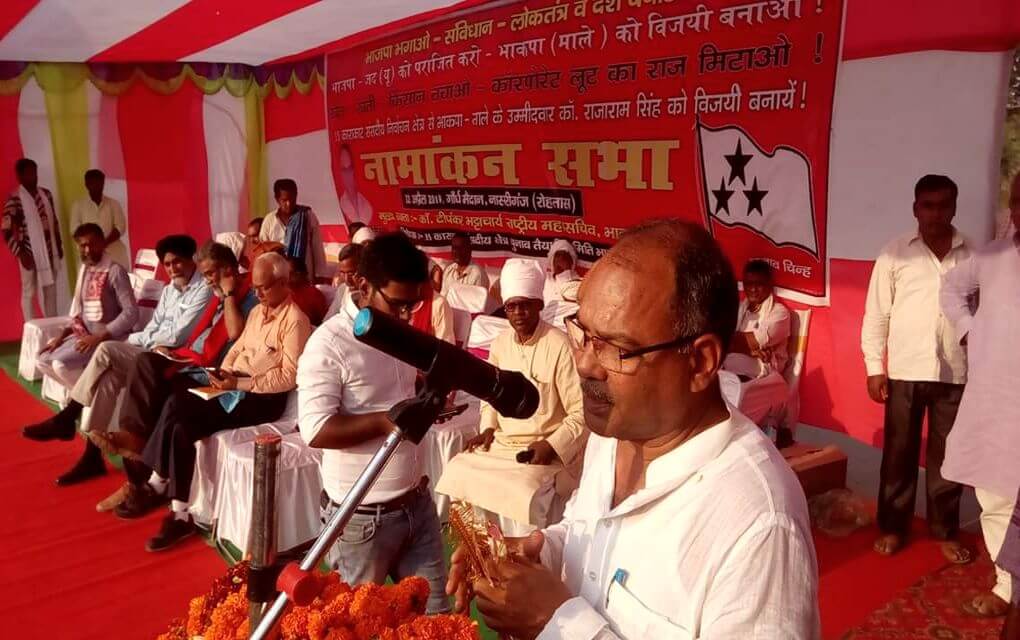
Karakat Rallies With Comrade Rajaram Singh
CPI(ML) candidate for the Karakat (Bihar) Lok Sabha seat Comrade Rajaram Singh was born on 27 March 1958 at village Akauni in Aurangabad District. During his school days when the Bihar student movement started in 1974, he joined the movement and became a popular student leader. Later, he took admission in the Bihar College of Engineering (Patna University). In 1982-83, while he was a student of Civil Engineering, Girindra Kumar, a student of BN College at Patna University was thrown from the terrace by the CRPF and killed. This caused the students to erupt in anger and Rajaram Singh led the movement against this incident under the banner ‘Chhatra Sangharsh Morcha’.
Comrade Rajaram has been associated with the Party movement since 1971. He took part in the students’ National Coordination Committee meeting at Madras led by Comrade Ganeshan. On returning to Bihar, he became the President of the Creative Students’ Union and later of the All Bihar Students’ Union. He was the Founder President of the Revolutionary Youth Association (RYA).
In 1982 he became a member of the IPF National Council and subsequently held the posts of Patna District Secretary and IPF Office Secretary at Delhi, and was the IPF in-charge of Punjab, Rajasthan, and Delhi.
In 1990 he represented India in Nepal at the invitation of the Communist Party of Nepal (Marxist-Leninist) Youth Association in the presence of renowned CPN(ML) leaders Madan Bhandari and Jeevraj Ashrit. When the Bathe massacre happened and the last rites of the 72 martyred comrades were going on, Comrade Rajaram along with Comrade Vinod Mishra organized a meeting there. Around the same time, riminals on horseback protected by feudal forces perpetrated the mass carnage n the ravines of Diyara in Khagariya District. Comrade Rajaram was part of the CPI(ML) fact-finding team to enquire into the incident and visited the area. Incessantly leading and participating in struggles for the issues and problems of the people of his area, he evinced ideological, political and organizational skills and established himself as a strong CPI(ML) leader and speaker. He first fought elections as a candidate from the Obra Assembly constituency in 1985. He represented this constituency as MLA from 1995 to 2005. The people of this region remember him even today for the development work that he did as their representative MLA. So much so, that even his political opponents acknowledge his good work. People here cannot forget his contribution as an MLA to the Son canal movement, construction of four big bridges, construction of ‘gully’, ‘nali’ and roads from villages to the city, construction of the Town Hall, construction of bridge and road from Shankarpur to Powerganj station, and passing of the railway line from Barun to Bihata. While he was MLA, he organized development conferences where he presented his report card amongst tens of thousands of people. The model that he presented as a people’s representative is worthy of being followed. It speaks of his immense popularity that he is fighting the Lok Sabha election as the Party candidat for the 10th time. When Chhotu Kushwaha (Mukhiya) was killed on 2 May 2012 by notorious criminal and Ranveer Sena cohort Sunil Pandey, Comrade Rajaram led the upsurge of people’s anger and led the 30,000-40,000 strong people’s protest at the Aurangabad Collectorate. The police unleashed a brutal lathi charge on the protesters and the then SP Siddharth Gautam himself attempted to kill Comrade Rajaram. Hundreds of people were injured in this agitation. Comrade Rajaram Singh was thrown into jail. An Aurangabad Bandh was organized on 4 May, followed by an entire Bihar bandh. From jail he wrote a letter addressed to the people which was read out during the rally at Bhojpur on 17 May. Later, the Human Rights Commission acted against this brutal atrocity and fined the SP Rs 1 lakh. This was the first time in the history of Bihar that such an action was taken. Last year when BJP supporters broke down the statue of Lenin in Tripura, Comrade Rajaram went to the place and addressed Press conferences at Agartala and Delhi along with CPM MPs.
At present Comrade Rajaram Singh is the General Secretary of the All India Kisan Mahasabha and a member of the working group of the ‘Akhil Bharatiya Kisan Sangharsh Samanvay Samiti’. Thus, he is at the forefront of the ongoing countrywide farmers’ struggle and was one of the leaders of the historic Delhi March by farmers. Today the people of this region wish for a rejuvenation of the canals on the Son River (the life-line of this region), construction of the Indrapuri reservoir, and a movement in Parliament as well as on the streets for the construction of the Aurangabad-Bihata railway line. In recent times, Comrade Rajaram Singh has stood firmly with the struggles of workers, daits, women, minorities, Anganwadi and other scheme workers, and today he seeks your support and cooperation in the fight to save our country, Constitution, and democracy and defeat the BJP-JD(U) alliance in this Lok Sabha election.
JHARKHAND
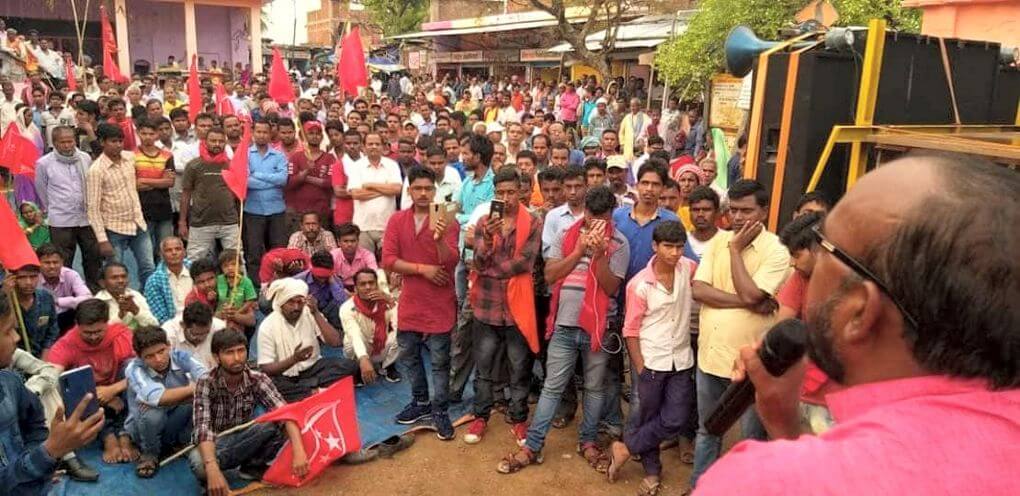
Rajkumar Yadav: The Voice Of People's Movements
The CPI(ML) candidate from Kodarma, Rajkumar Yadav, was born in October 1970 in the Gawan region of Giridih District of undivided Biihar. Gawan, now in Jharkhand borders Bihar’s Nawada District. In the 1980s this area was notorious for the rampaging criminal gangs who had cast a web of fear through a series of kidnappings and murders. Against this rose a spontaneous movement against the criminal gangs. As a young boy who had just passed his matriculation examinations Com. Rajkumar was a part of this movement and was arrested in 1986 in what was going to be the first of a series of false cases against him.
But like many revolutionaries, his time in Giridih jail was to be a life-changing experience for him. In jail he met Comrade Mahendra Singh, the legendary communist leader and popular CPIML MLA of Bagodar. From him, Comrade Rajkumar learnt about the history and movement of CPIML and IPF. He became Comrade Mahendra Singh’s most trusted comrade in the struggle against the highhandedness of jail authorities and for better treatment of prisoners. Mahendra Singh was released in 1988 but Comrade Rajkumar continued to read communist literature in jail. After he was released in March 1993, he formally joined the CPIML.
Comrade Rajkumar contested his first election in the 1995 Assembly elections from Rajdhanwar in which he got 7000 votes. He continued his struggle against the terror of criminal gangs, for the rights of workers and farmers and corruption in the administration. In August 1995 he was again jailed for two and a half years. In the first elections to the Jharkhand Assembly in the year 2000, on the strength of the consistent movements he led in the area, he lost the Rajdhanwar Assembly seat by a slender margin of 1700 votes.
The first few years of the new state of Jharkhand were tumultuous. The state which was formed with the hopes providing the people of the state control over their resources was soon dashed and the ruling BJP Government under Babulal Marandi turned into a regime of loot and plunder of Jharkhand’s precious natural resources. The bogey of Maoism was used to silence, target and arrest those who were protesting the regime of loot and plunder. In Rajdhanwar, Comrade Rajkumar was at the forefront of the movement against the witch-hunt of activists in the name of cracking down on Maoists. The party, during the same time also launched a powerful movement in the area against feudal threats which prevented Dalits from casting their votes, and against bonded labour. In the course of this movement, more than 400 bonded labourers were freed. But as a result Comrade Rajkumar became a target for feudal forces and the State.
On 22nd January 2003, while leading a protest at the Markacho Police Station against growing crime in the area, the police under Babulal Marandi’s orders opened fire on the protestors in which 4 comrades were killed and Comrade Rajkumar who was the target had a narrow escape. In Telodih village in Rajdhanwar, a police constable died in an accident, and using this as a pretext the police unleashed severe repression in the village. The villagers, most of them Muslims, left the village for fear of being arrested. Comrade Mahendra Singh along with Comrades Rajkumar Yadav and Mustaqim Ansari mobilized the villagers and stood up to the reign of terror of the police and ensured the return of villagers.
Again in 2004 Comrade Rajkumar was jailed and contested the Lok Sabha elections from jail, getting 1,37,000 votes. After the assassination of Comrade Mahendra Singh, Comrade Rajkumar again lost the Rajdhanwar Assembly election by a narrow margin of 4000 votes. The exploitation of mica mine workers had become a huge issue in the area and Comrade Rajkumar was again in the forefront of this movement.
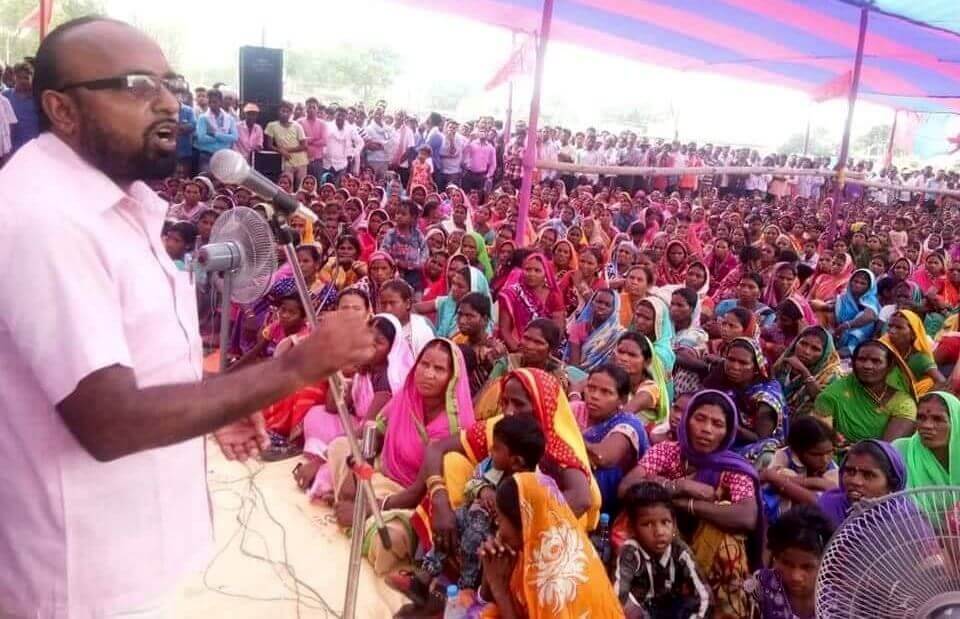
In the 2009 Lok Sabha elections he lost the Kodarma seat by 40,000 votes to Babulal Marandi, by then a JVM candidate. In 2014, despite the Modi wave, he polled second in the Kodarma Lok Sabha with more 2, 66,000 votes and lost to the BJP candidate Ravindra Rai. Marandi, the sitting MP from Kodarma, did not even dare contest in 2014, but the candidate from JVM polled a distant third, and later went over to BJP. In the 2014 Assembly elections Comrade Rajkumar defeated JVM's Babulal Marandi by more than 10,000 votes.
As an elected MLA, he has consistently been the voice of various peoples’ movement in the Jharkhand Assembly. In the Assembly he exposed the staged surrender of more than 450 supposed Maoists. The 'Maoists', it turned out, were young men paid by the police to enact in a scene of surrender. He has been a powerful voice of protest in the Assembly against the dilution of SNPT and CNPT laws as well as the hunger deaths in Jharkhand and the issue of para-teachers. In his constituency his initiatives have led to providing drinking water in villages populated largely by dalits and adivasis, the repair and rebuilding of major roads. From his own MLA funds he has provided Rs 1 lakh for every high school to purchase new books for the library.
In the 2019 LS elections, he is contesting once again as the candidate of CPIML from Kodarma Lok Sabha. He is up against Annapurna Devi of BJP, who till two weeks ago was the State President of RJD in Jharkhand and was giving speeches against Modi’s Chowkidari, and against Babulal Marandi whom he defeated in the previous Assembly elections and 6 out 8 of whose elected MLAs have already joined the BJP. The BJP, fearing defeat by CPIML, even denied a ticket to its sitting MP Ravindra Rai and had to ‘import’ a candidate from another party.
A victory for the CPIML and Rajkumar Yadav on the Kodarma seat will be a powerful blow to the fascist BJP and a fitting rebuff to the political opportunists who betray the struggles for social justice, people's rights, and emancipation of the oppressed.
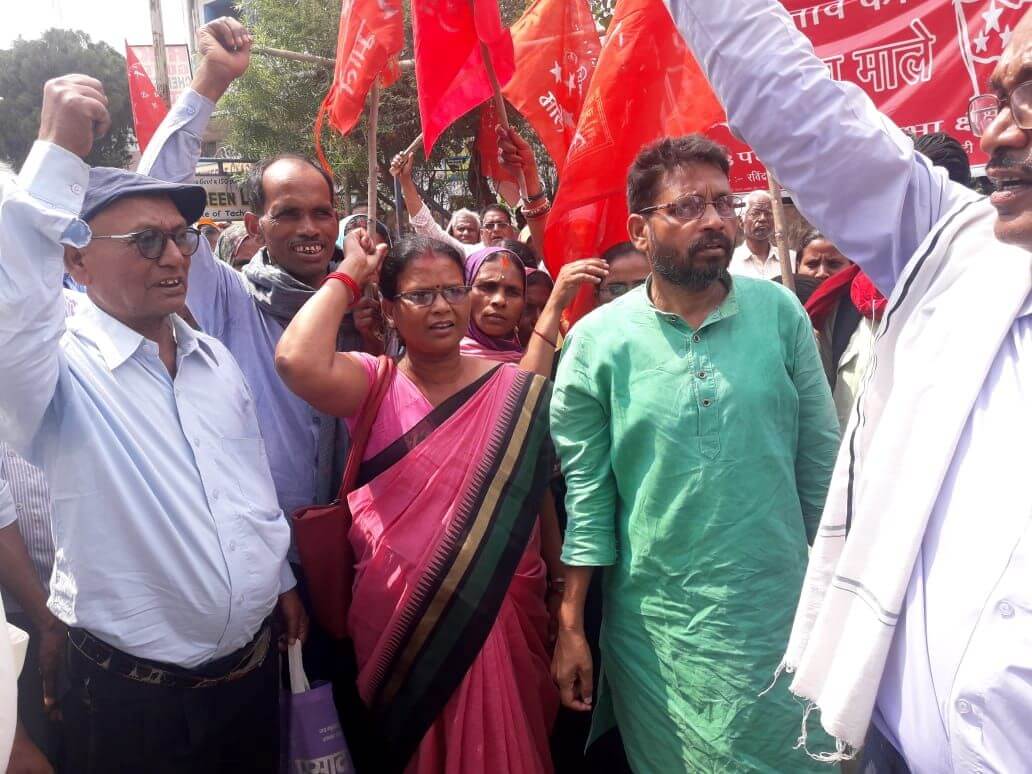
Comrade Sushma Mehta and CPI(ML) Struggles in Palamu
Sushma Mehta, CPI(ML) candidate for the Palamu (SC) Lok Sabha seat, is a 40 year old dedicated and committed leader. As a popular leader, she won the election for District Council member in 2011 and went on to become the President of the District Council. She is a resident of Korta village in Danda Block, Garhwa District, and has been educated up to the Inter level. At present she is a member of the CPI(ML) State Committee and a Jharkhand State level AIPWA leader and Garhwa Division in-charge.
On 21 January 2012 adivasis organized a dharna at Badgad village in Bhandariya Bllock, Garhwa District against the police beating of adivasi Mukhiya Ramdas Minj and to demand the construction of a Health Centre at a place acceptable to the adivasis. Comrade Sushma was also invited to the dharna. Notification of this was given to the police and to the administration and yet no arrangements were made for her security. On the way, Comrade Sushma was kidnapped by Maoists. Actually, the Maoists were also preparing for an attack on the police picket which was proceeding towards the dharna venue for repressive action. Comrade Sushma faced this situation with courage and patience and spoke with her kidnappers, as a result of which they released her after 5 days.
The CPI(ML) has been waging relentless was against feudal dominance in the Palamu-Garhwa region. Our Party is known in the Palamu Lok Sabha constituency as one that stands up and fights against attacks on any section of the people. Last year, the sand mafia in Bishnupura Block killed the members of a Yadav family. It was the initiative taken by the CPI(ML) which led to the arrest of the feudal elements responsible for this crime. MLA Rajkumar Yadav addressed a huge rally which the Party organised in that region and also met and reassured the affected family. Apart from this, the Party has also raised its voice against half a dozen killings by criminal elements. The criminals secured the protection of the ruling powers, but the campaign and struggles of the CPI(ML) made it clear to the people that the BJP MLA was shielding and saving the criminals.
Our intervention against starvation deaths in this region has also proved effective. Attempts were made to crush this struggle though false cases against our leaders. Struggles have also been carried on in many villages against illegal capture of adivasis’ lands. Our Party and our candidate Comrade Sushma Mehta have been closely associated with the struggles of the mid-day meal cooks in Palamu.
The Party and its student organization AISA have also raised their voice strongly on student issues. We have fought successful battles on the issue of forest land pattas in many villages. We have also campaigned strongly to demand that the first use of water from rivers in Palamu Division should be for a solution to the drought problem in this region. We have carried out campaigns for a solution to the acute water problem faced by the people. The Party’s vociferous articulation against the increasing attacks on minorities and oppression of dalits is well-known. Thus, the Party has an identity of its own in this region as an articulate voice on people’s issues.
In the 1990s, CPI(ML)’s initiatives spread rapidly in the rural areas of Palamu District which was in the clutches of extreme feudal oppression. As in Bhojpur-Punpun, rural poor youth were attracted on a large scale to the CPI(ML). That was the time when the phase of direct legal and Parliamentary struggle had begun under the leadership of the CPI(ML). Hundreds of rural poor from the Palamu District participated in the IPF rally at Gandhi Maidan, Patna in 1990-91. This resulted in a wave of fear across the feudal dominant sections in the region. At that time itself, the CPI(ML) threw an direct challenge against the dominant feudal Raj. As the people’s struggles developed and spread, the organisation and mass base of the CPI(ML) also developed and spread and the challenge to the feudal Raj reached a pinnacle which continues even today.
Palamu is the only Scheduled Caste Lok Sabha constituency in Jharkhand. This Lok Sabha constituency is made up of Garhwa and Bhavnathpur Assembly segments in Garhwa District and Daltonganj, Chhatarpur, Hussainabad and Vishrampur Assembly segments in Palamu District. Despite being reserved for the dalit community, upper caste feudal forces have always been dominant in the socio-economic life of this region.
From the Gatbandhan, this seat has gone to the RJD quota, but former RJD State President and long-time MLA from Garhwa Girinath Singh has somersaulted and joined the BJP. Former MP from this seat, Manoj Bhuiyan has been suspended from the RJD. Possible JVM candidate and founder-member of that Party Prabhat Bhuiyan has also joined the BJP. The large-scale scattering of RJD-JVM leaders in Jharkhand is a prominent issue. So much so that even RJD candidate Ghuran Ram has tasted the waters of several Parties, including RJD, JVM and BJP. In the last election he was the JVM candidate; he has come to the RJD just a few months ago.
The CPI(ML) has not only stood firm as a political force in favour of the poor against dominant feudal forces, it is also recognised as the foremost force of struggle in the present time. The CPIML is the most consistent and dependable force to resist and defeat the BJP in Palamu.
UTTAR PRADESH
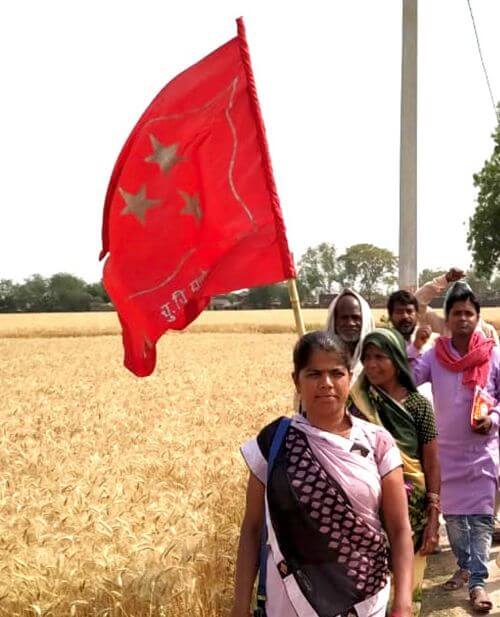
Comrade Jeera Bharti: Courageous Leader From Mirzapur
The CPIML candidate from Mirzapur, Comrade Jeera Bharti comes from a dalit, landless agrarian worker’s family in Reksa Khurd village, Madihan Tehsil, Mirzapur District.
Bearing the responsibility of head of the family, she worked and earned wages to sustain her family. In the year 2002-03 she came into contact with the Party and the Communist movement. That was the time when in the name of anti-Maoist operations in Mirzapur the BJP was carrying out the campaign of “Kill Four in Retaliation for One” and the SP-BSP governments were carrying out the “community policing” campaign through which dalits and adivasis were repressed, thrown into jail and made the target of fake encounters. The CPI(ML) stood firmly in support of the dalits and adivasis and fought strongly against the State repression. Comrade Jeera joined the struggles carried out by the Party and soon became active in these struggles; so much so that the government had to stop the repression on dalits and adivasis.
Through these struggles, Comrade Jeera came to be recognised as a well-loved CPI(ML) leader fighting against repression in this region. She went on to lead further struggles on the issues of livelihood and land for the rural poor. In Block Patehara, the nouveau-riche feudal farmers were paying rural agrarian workers a wage of only Rs 60 per day. Comrade Jeera led protests against this and organised a workers’ strike, after which the Tehsil administration was forced to hold tripartite talks in which minimum wages were fixed. But afterwards the feudal forces went back on the agreement and did not pay the stipulated minimum wage and Comrade Jeera took the struggle forward once again. As she was returning home one day after campaigning in the region, the feudal forces attacked her brutally. But the administration filed false cases against Comrade Jeera and her entire family and tried to throw her into jail.
However, AIPWA launched a national level protest and the Party organised a strong protest in the District in which thousands of dalits and adivasis participated. A protest march and meeting was organised at Comrade Jeera’s village. Finally, the administration had to bow down. Comrade Jeera is known throughout the District for her committed struggles against corruption and loot in MNREGA, for the dignity of women and against violence against women, and for her dedicated political activism.
Comrade Jeera was the CPI(ML) candidate for the Mirzapur Lok Sabha constituency in 2014, and fought the District Panchayat election in 2015. She is once again the Party candidate for the Mirzapur Lok Sabha seat in 2019.
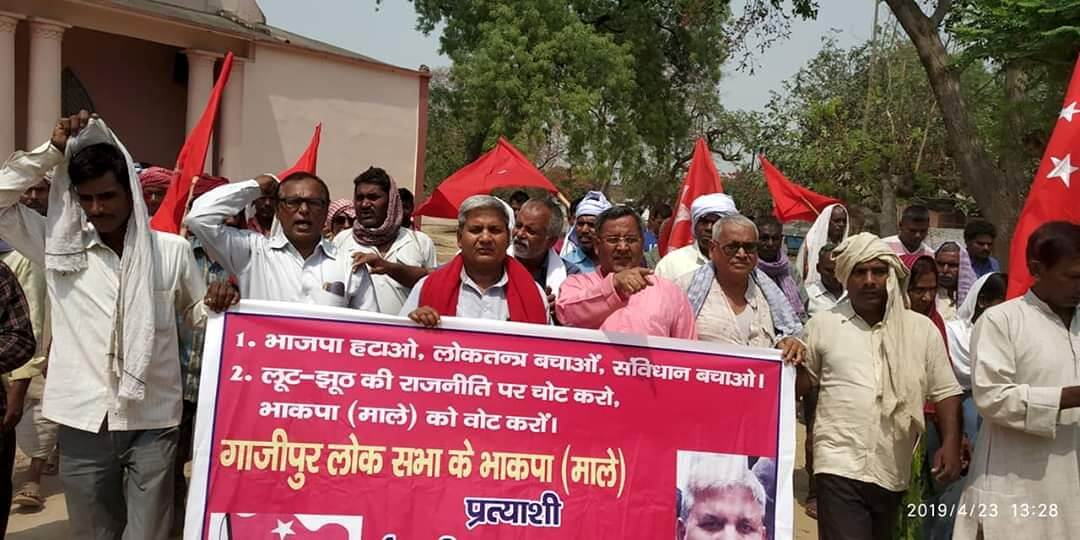
Ishwari Prasad Kushwaha: National Farmers' Movement Leader and Ghazipur Candidate
Comrade Ishwari Prasad Kushwaha was born in a poor farmer’s family on 18 September 1958 at village Lahuar in the Jamania-Tehsil Thana region. He has been working with the Communist movement ever since his student days. He became involved with the students’ agitation in 1977 after the Emergency and was active in the the PSO, the student organisation that was one of the forerunners of AISA. It was during that time that he came into contact with the CPI(ML) and took part in the Allahabad Tarachand Hostel representatives’ election to become a member of the Executive Council. He left an advocate’s practice in the High Court and joined the anti-feudal struggle through participation in farmers’ movements. He played a leading role in the Ghazipur-Jamania border anti-feudal struggle in 1992 and led the Party’s movement against agrarian distress. He has played an important role in the expansion of the Party in the region and was a member of the District Panchayat from 2000 to 2005. During that period, two mafia goons were fighting the District Panchayat Presidential election. As a District Panchayat member Ishwari Prasad Kushwaha said that he would not vote for these mafia elements, and he withheld his vote. This act of integrity gave him and the Party recognition in the entire District.
Ishwari Prasad raised his voice against the Mandsaur police firing on protesting farmers, and was involved in the farmers’ protest to demand loan waiver and other rights in which 210 organizations from across the country participated. He is associated with the Akhil Bharatiya Kisan Sangharsh Samanvay Samiti through which he is the voice of the farmers in his District as well as across the country. He led the struggle for proper compensation to farmers whose land was acquired for the Tadiighat-Mau railway line in Ghazipur with the agitation at Shaheed Bhagat Singh Park last year, and since then has continued to raise his voice for farmers’ issues. Under pressure from the farmers’ movement, work on the rail-cum road bridge has been stopped. Ishwari Prasad Kushwaha has incessantly raised his voice for the poor and dalits. He is a member of the CPI(ML) Central Committee and National Secretary of the All India Kisan Mahasabha. He is the CPI(ML) candidate from the Ghazipur Lok Sabha constituency.
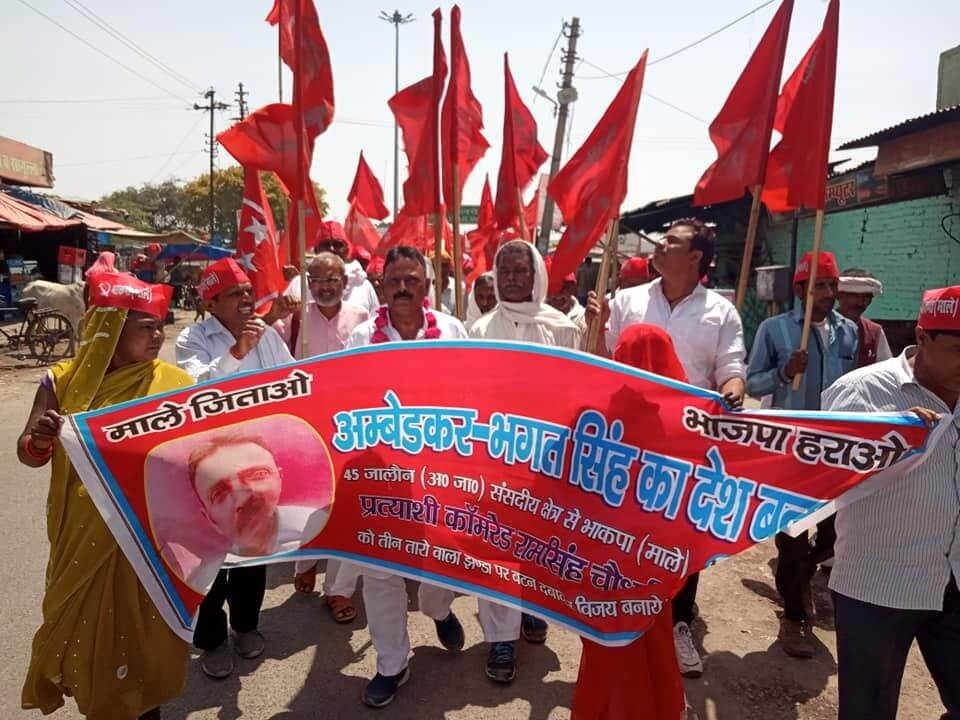
Comrade Ram Singh Chaudhury: Candidate From Jalaun
CPIML candidate from Jalaun, UP, Comrade Ram Singh Chaudhury was active in students’ politics, through which he joined the Communist movement. His father Vrindavan was a worker and a leader of the Socialist movement.
Comrade Ram Singh became a frontline leader in the CPI and a State leader in the Khet Mazdoor Sabha. But he became disillusioned with that Party’s reformist policies and became associated with the IPF. Prior to this he had been jailed several times for political reasons. After he came into contact with the late Comrade Ishwar Chandra in Jalaun became a member of the CPI(ML). He first fought as a candidate in the Jalaun city Sabha and Presidential elections. Later, at the time of the Modi wave in 2014, he fought from Jalaun Garotha and secured 4767 votes. At present Comrade Ram Singh Chaudhury is the Joint Secretary of the Nirman Mazdoor Union (Uttar Pradesh) and a National Executive Council member of the All India Construction Workers Federation. Ever ready to carry out and lead movements, he has worked to sharpen and strengthen workers’ movements and is expanding the Party’s work among construction workers in other Districts also. Comrade Ram Singh Chaudhury a revolutionary leader and is the CPI(ML) candidate for the Lok Sabha constituency of Jalaun.
TAMILNADU
Courageous Workers' Leader Comrade Palanivel From Sriperumputhur
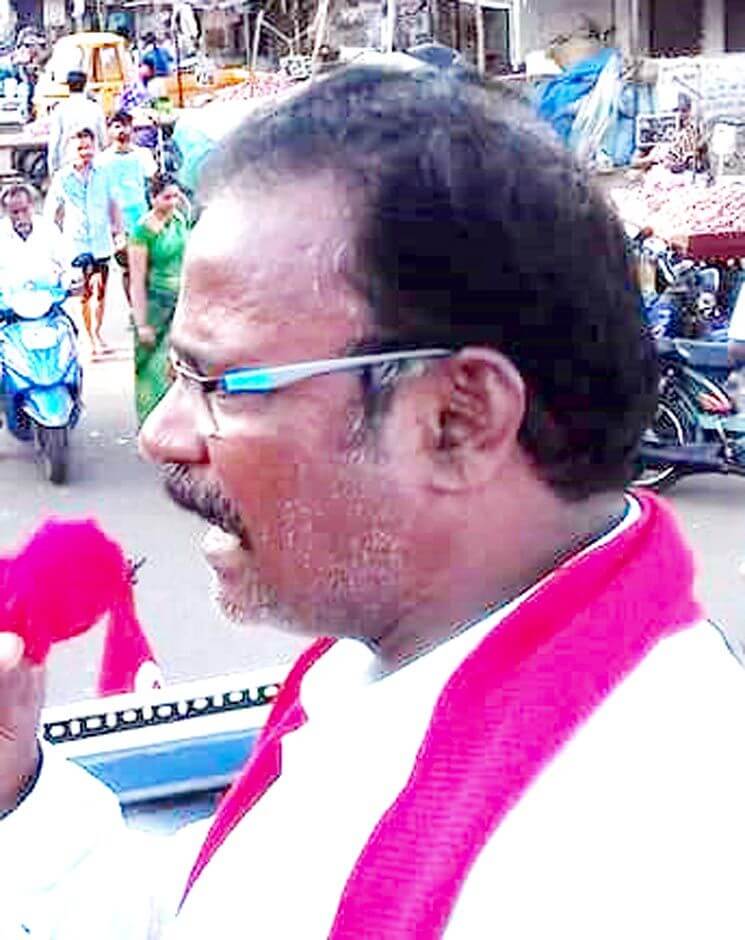 Comrade K Palanivel is a leader of organised and unorganised workers in Sriperumputhur and Tamil Nadu.
Comrade K Palanivel is a leader of organised and unorganised workers in Sriperumputhur and Tamil Nadu.
One of the state secretaries of AICCTU, Comrade Palanivel is also a dalit candidate in a general constituency. He is a worker of the Murugappa group’s TI Diamond Chain company. He took charge as General Secretary of the industry union by the year 2000. He went on a successful 3-day fast on the issue of workers’ bonus inside the factory in the year 2004. He signed 3 long term settlements along with Com.Kumarasamy as President of the union which hugely benefited workers.
As district secretary of Thiruvellore Democratic Labour Union, his role was crucial in arriving wage settlements at Indo Tech, Standard Chemicals, Mercury Fittings, and Jay Engineering.
After taking over leadership at another company Onload gears, he implemented uniform bonus to all category of workers viz, permanent, contract and trainees. Also more than 100 workers were made permanent. Winning a Rs 8000 wage increase in the same industry in the 2016 agreement in basic pay and DA alone is remarkable in the given scenario.
In the Well Make company, a management-sponsored ADMK union was functioning for a long time, and the management would not recognise AICCTU. After 9 months of protracted struggle, the MD was forced to come down to AICCTU’s office to sign an agreement with Comrade Palanivel. He underwent a fast for 5 days for the closure of a liquor shop at Ambattur residential area and when private parties are trying to encroach a ground belonged to Dunlop factory which is being used by local youth as playground at Ambattur, CPI(ML), RYA and Comrade Palanivel forced them to retreat.
In support of cause of Pricol workers, he along with group of workers went on a relay fast which was inaugurated by Justice Hari Paranthaman, retired judge of Madras HC. Criminal cases were foisted against Comrade Palanivel for taking part in struggles against NEET and 8 way lane Chennai – Salem project.
Comrade Asaithambi
Tiruchirapalli - Leader of Rural Struggles For Rights and Dignity
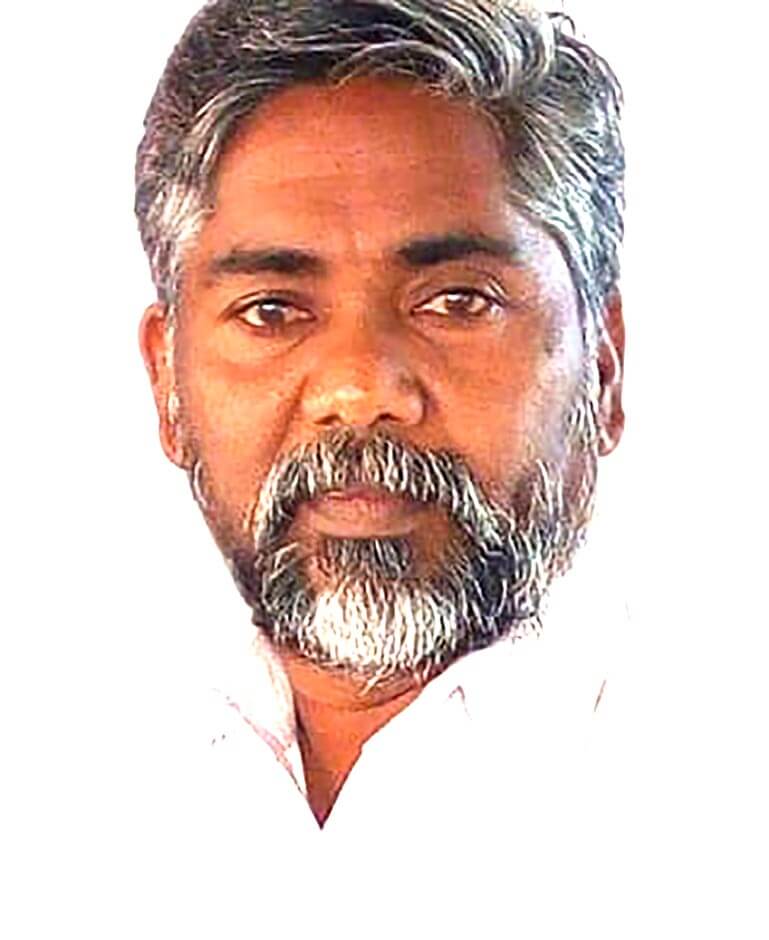 The CPI(ML) Candidate from Tiruchirapalli Comrade P Asaithambi has consistently led struggles of peasants and agricultural labourers and dalits.
The CPI(ML) Candidate from Tiruchirapalli Comrade P Asaithambi has consistently led struggles of peasants and agricultural labourers and dalits.
Comrade Asaithambi is the party’s Pudukottai district secretary and our area of work falls with in Tiruchirappalli parliamentary constituency. He is a Dalit candidate in a General constituency. His rival contending candidates from other formations in this election are all from dominant castes.
Comrade Asaithambi was active in progressive politics since his college days.After joining CPI (ML), he began taking up people’s issues in the district. Pudukottai district’s agriculture is predominantly rain fed and the agrarian crisis is severe. Most of the district’s youth migrate to cities and Gulf countries as labour, and the living conditions remain pathetic. Only homestead lands tie peasants to their villages. Every village has a separate dalit hamlets and untouchability is rampant. Comrade Asaithambi was in the forefront in abolishing double tumbler system, a form of untouchability which prevails in tea shops.
CPI(ML) and candidate had hands on experience of organising MNREGA workers beyond caste divisions for wages. He also organised struggle against a liquor factory at Kallakottai, which endangers ground water; for this, criminal cases were foisted against him.He involved himself in CPI(ML) ‘s initiative of socio-economic study of Gandarvakottai assembly constituency. House and homestead pattas are important demands and numerous struggles were conducted on this demands and had an experience of snatching victory in one case with an allotment by Government.
When Methane and Hydro carbon projects are a threat to the delta region, Comrade Asaithambi went there in solidarity with struggling masses.He led many movements for Tamilnadu’s right over Cauvery water, and has faced arrests for these.
He was also arrested for joining in a struggle against NEET exam at Chennai. When Pudukottai district was worst affected by the Gaja storm, he led many relief activities. He continues to be a full time political activist after graduating with a BA/B.Ed degree.
PUDUCHERRY
Workers' Leader Comrade Mothilal
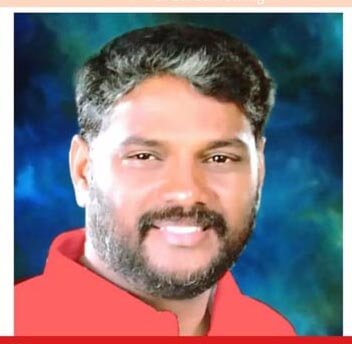 Comrade Mothilal, aged around 40, is a worker turned trade union activist and a member of CPIML Puducherry State Committee and also the state Vice President and CWC member of AICCTU. He joined AICCTU in 2000 and also the CPIML.
Comrade Mothilal, aged around 40, is a worker turned trade union activist and a member of CPIML Puducherry State Committee and also the state Vice President and CWC member of AICCTU. He joined AICCTU in 2000 and also the CPIML.
He was working in a disposable syringe manufacturing factory in Puducherry which was later closed in the midst of trade union struggles.
He has led many struggles against long working hours that stretched up to 12 hours and more, for implementation of minimum wages, for workers welfare, etc. He is an ardent fighter against exploitation of workers in various forms. He has been taken into preventive custody several times for trade union and political struggles.
Recently, he led one of the most militant workers struggles in Puducherry. He organised workers of Sedarapet industrial estate, one of the significant industrial estates in Puducherry, led by various trade unions, in support of struggling workers of L&T under the banner of AICCTU and also against industrial accidents. The strike at the industrial estate that faced severe crackdown by police became a most popular struggle in Puducherry not only against the concerned managements but also against the police.
Comrade Mothilal is an emerging leader of young and energetic workers of Puducherry determined to forge an alternative politics. Comrade Mothilal was also a candidate in Muthialpet assembly constituency in 2011.
ANDHRA PRADESH
Comrade G Satyanarayana From Kakinada
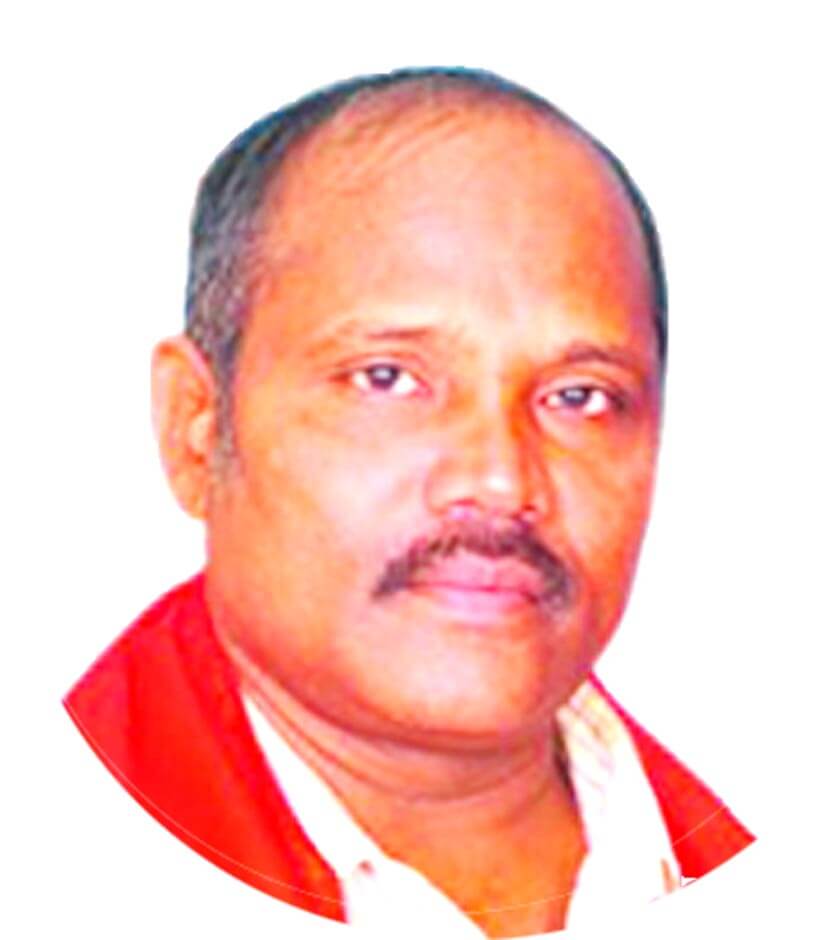 Comrade G Satyanarayana, the CPIML candidate from Kakinada (East Godavari District, Andhra Pradesh), was born in 1979. His family runs a very small grocery. He graduated with a BA from Dr.BR Ambedkar Open University.
Comrade G Satyanarayana, the CPIML candidate from Kakinada (East Godavari District, Andhra Pradesh), was born in 1979. His family runs a very small grocery. He graduated with a BA from Dr.BR Ambedkar Open University.
Inspired by Comrade Vinod Mishra, he joined the CPIML. He left his job in the Pithapuram Sugar Factory to work full time for the party during the 1999 general election campaign.
He had actively participated in the movement against the then Chandrababu Naidu Government’s hike in electricity charges in the year 2000 (a movement which faced police firings in which four people were killed).
He became the member of East Godavari district committee of the party in the 2002 District conference. He has led many successful struggles of the Kisan Sabha and AIARLA in rural East Godavari for homestead and agricultural lands for the poor and landless in Kothapalli, Samalkot, Pithapuram and kKkinada rural mandals. In this process, he has faced death threats from landlords, harassment from revenue and government officials, faced police cases and even been jailed in Pithapuram and Rajamundry central jail for some time. He was elected as a party state committee member in the 2009 state conference, and has served as secretary of East Godavari and Krishna districts.
Comrade PS Ajay from Anakapalli
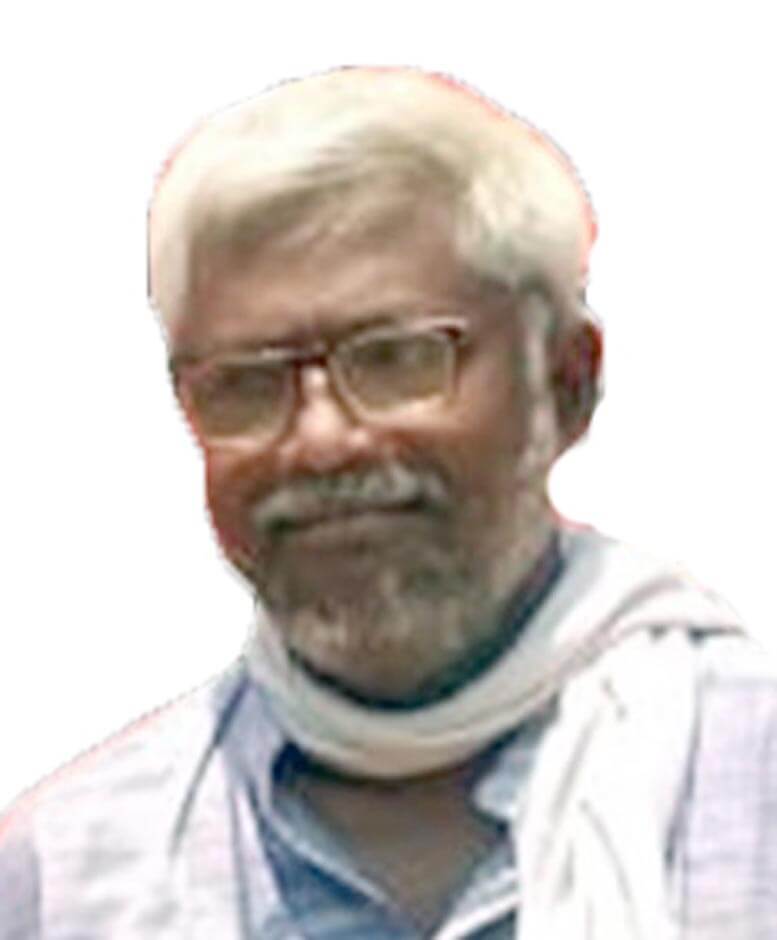 Born in 1961, with a Masters in Social Work and an LLB law degree, Comrade PS Ajay is well known for 3 decades of work on land rights, Adivasi rights and proper implementation of MGNREGA and Forest Rights Act in the Telugu states, especially among the poor and landless rural and tribal people of Visakhapatnam district. He also led struggles to ensure that the Land Acquisition Act(2013) included a clause to ensure the rights of assigned land owners. He has successfully led the political and legal struggles for increasing the wages of MGNREGA workers from Rs.100 to Rs.121 per day.
Born in 1961, with a Masters in Social Work and an LLB law degree, Comrade PS Ajay is well known for 3 decades of work on land rights, Adivasi rights and proper implementation of MGNREGA and Forest Rights Act in the Telugu states, especially among the poor and landless rural and tribal people of Visakhapatnam district. He also led struggles to ensure that the Land Acquisition Act(2013) included a clause to ensure the rights of assigned land owners. He has successfully led the political and legal struggles for increasing the wages of MGNREGA workers from Rs.100 to Rs.121 per day.
Before associating himself with CPIML Liberation recently, he had worked as part of well-known people’s organizations such as Andhra Pradesh Vyavasaya Vruttidarula Union (APVVU) and Rythu Swarajya Vedika (RSV). He is also a talented cultural activist and known by people as writer and singer of inspiring songs. He has published 3 books and has written numerous articles in newspapers and magazines.
PUNJAB

CPIML is contesting three Lok Sabha Seats in Punjab: Gurdaspur, Bathinda and Sangrur.
Com. Ashwini Kumar Chalotra will be the party’s candidate from Gurdaspur, rural workers’ leader Comrade Bhagwant Singh Samaon will be the party’s candidate from Bathinda and peasant leader Comrade Gurnam Singh Bhikhi will be the party’s candidate from Sangrur.
WEST BENGAL

From West Bengal, the CPIML has fielded seasoned leaders of peasant and agricultural workers, Comrade Sajal Adhikary from Hooghly and Comrade Subimal Sengupta from Krishnanagar.
ODISHA
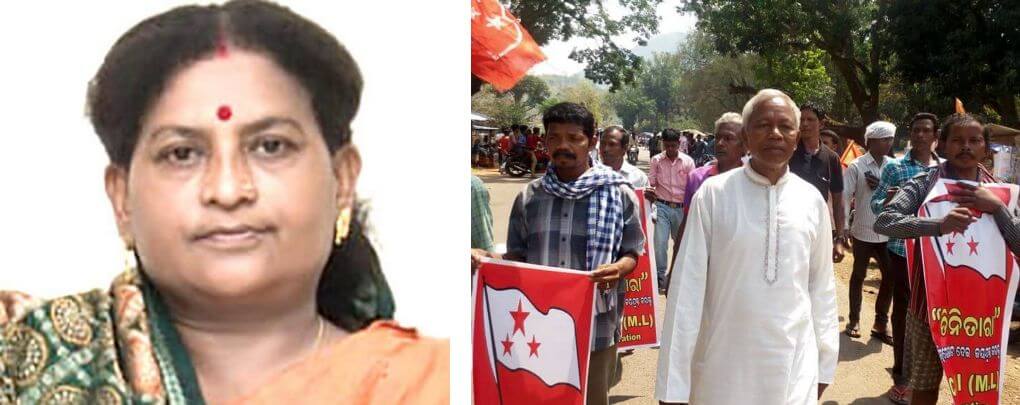
In Odisha, the party is contesting two seats. From Puri, facing the notoriously communal loudmouth BJP candidate Sambit Patra, is Mandakini Sethi, a leader of women’s movements and Dalit movements in Odisha.
In Koraput (ST), one of the most backward districts in the country, the party’s candidate is Damodar Sahar, a leader of struggles of adivasis and Dalits for land and rights in the region. Comrade Damodar has been in the news for the fact that his total assets amount to a mere Rs 15,000.
UTTARAKHAND
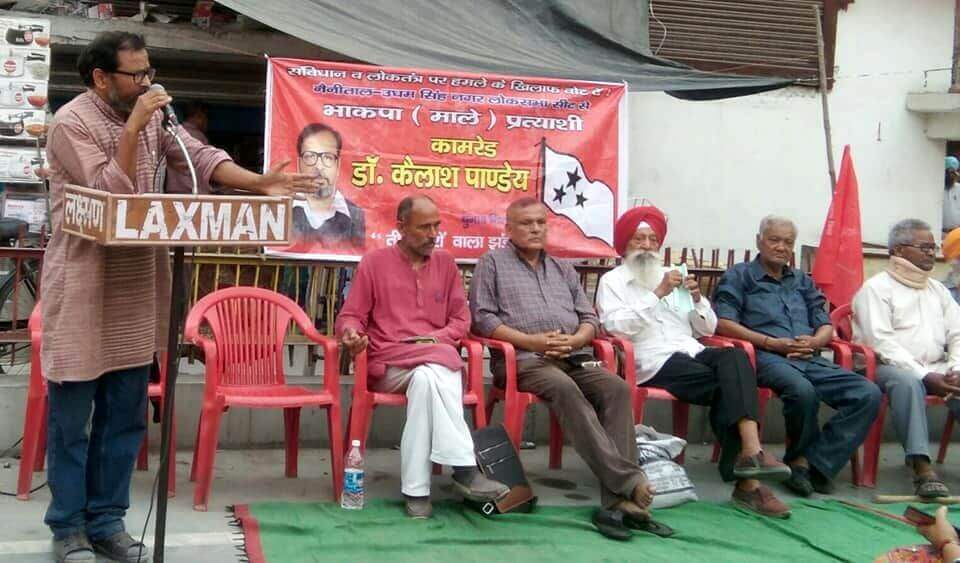
The CPIML candidate from the Nainital constituency in Uttarakhand, Kailash Pandey, has been a dedicated Left activist since his student days. He began his activism as a leader of the AISA, making his mark in student movements that inspired the whole state. After his student life, he has been an organiser of struggles of rural labourers and workers. He enjoys the confidence and support of workers from a variety of different sectors, including women ASHA and midday meal workers.
Liberation Archive
- 2001-2010
-
2011-2020
- 2011
- 2012
- 2013
- 2014
- 2015
- 2016
- 2017
- 2018
-
2019
- JANUARY-2019
- FEBRUARY-2019
- MARCH-2019
- APRIL-2019
-
May-2019
- The BJP's 2019 Manifesto: Blueprint of Disaster
- BJP's Poll Plank: Lies, Fear, Hate, and Terror
- CPIML Complaint to the Election Commission of India
- CPIML In The Battle of 2019
- Vote Out BJP's Agenda Of Hate Lock, Stock, And Barrel
- Jallianwala Bagh Massacre Centenary: Tribute to Martyrs at Amritsar
- Indian Railways Employees Federation Conference
- Comrade Lalit Mohan
- LIBERATION, JUNE 2019
- Liberation JULY 2019
- LIBERATION, August 2019
- Liberation, SEPTEMBER 2019
- Liberation, OCTOBER 2019
- Liberation, NOVEMBER 2019
- Liberation, DECEMBER 2019
- 2020
- 2021-2030
Charu Bhawan, U-90, Shakarpur, Delhi 110092
Phone: +91-11-42785864 | Fax:+91-11-42785864 | +91 9717274961
E-mail: info@cpiml.org







